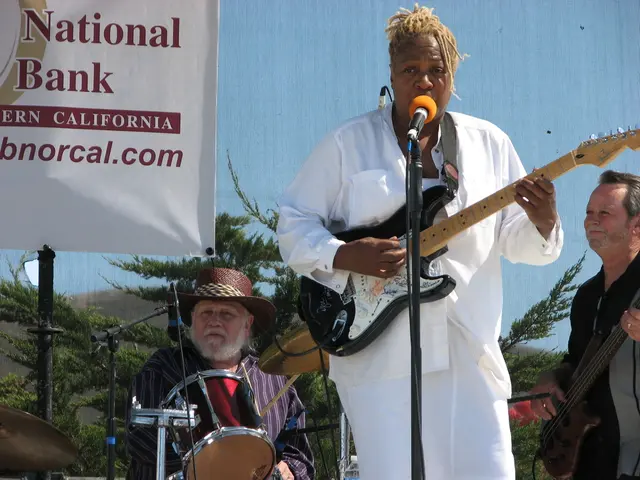U.S. President Donald Trump remolds media terrain post-Kimmel: Who's in his scope now?
In a recent development, President Donald Trump's comments aboard Air Force One, following his second UK state visit, have stirred a controversy over freedom of speech in the United States. Trump's remarks, which hinted at the cancellation of late-night host Jimmy Kimmel's show on ABC, have sparked a heated debate about the role of government in shaping the media landscape.
Trump's posts on Truth Social implied a connection between the cancellation and his pressure on companies, suggesting that he may be weaponizing the death of Charlie Kirk for political gain. The Writers Guild of America and Screen Actors Guild have condemned Kimmel's suspension as a violation of constitutional free speech rights.
Former US president Barack Obama has criticized the current administration for threatening regulatory action against media companies that don't muzzle or fire reporters and commentators disliked by the administration. Obama urged media companies to stand up against government coercion rather than capitulate to it.
Trump's comments indicate a disregard for the First Amendment of the US Constitution, which protects freedom of speech, press, and the right to petition the government. The First Amendment prevents government coercion of media companies and protects the freedom of speech, press, and the right to petition the government.
Trump has been reshaping the American media landscape by using multimillion-dollar settlements, costly litigation, and changes to programming to express his displeasure. He particularly scrutinizes major US media companies like The New York Times—against which he filed a multi-billion-dollar lawsuit—and social media giants such as Meta (Facebook), often targeting them with legal pressure and public accusations to suppress critical reporting and perceived bias.
The TV network ABC ceased the show of late-night comedian Jimmy Kimmel under pressure from Trump’s appointed media regulator, Brendan Carr, who issued a warning echoing Trump’s comments, hours before Kimmel was suspended. This move has been met with criticism from various quarters, with Stephen Colbert condemning Kimmel’s suspension as a "blatant assault on freedom of speech." Jon Stewart satirized the situation, describing himself as a "patriotically obedient host" and his programme as "administration-compliant."
There have been controversies surrounding Charlie Kirk's death, with some people trying to characterize the perpetrator as something other than a supporter of the MAGA movement and trying to score political points from it. Seth Meyers joked about Trump's administration pursuing a crackdown on free speech and expressed admiration for Trump.
As the debate over freedom of speech continues, it is hoped that media companies like NBC can stand up for their hosts' right to freely express themselves, upholding the principles enshrined in the First Amendment of the US Constitution. The question remains: Who is next, as free speech is under attack?
Read also:
- Late-night host Lawrence O'Donnell responds to Jimmy Kimmel's departure with a discussion on a subject "Donald Trump doesn't wish us to examine"
- EU Member States cast their decisions
- Eighteen-Year-Old Speaks Out Against Lowering Voting Age to Sixteen
- King Charles's body language analyst dissects signs of apparent 'impatience' exhibited by Charles towards Trump








